
tap4-ai-webui
One-click to deploy your own ai tools directory with the open source web-ui
Stars: 546
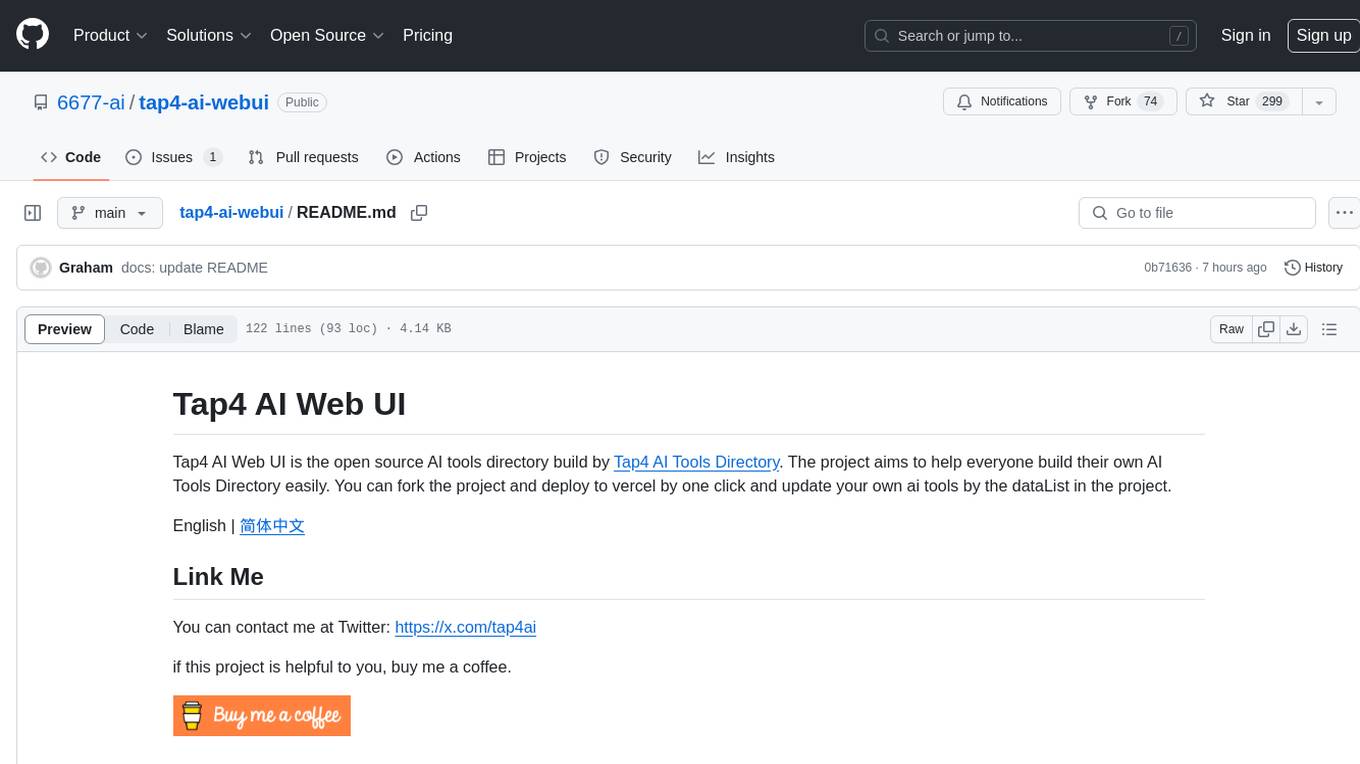
Tap4 AI Web UI is an open source AI tools directory built by Tap4 AI Tools Directory. The project aims to help everyone build their own AI Tools Directory easily. Users can fork the project, deploy it to Vercel with one click, and update their own AI tools using the data list in the project. The web UI features internationalization, SEO friendliness, dynamic sitemap generation, fast shipping, NEXT 14 with app route, and integration with Supabase serverless database.
README:
This is an open-source AI Tools Directory project from Tap4 AI Tool Directory. Our goal is to make it easy for everyone to have their own AI Tools Directory, to collect their favorite AI tool products. This project is very lightweight and easy to maintain, suitable for individual developers interested in AI navigation sites, and also suitable for learners interested in NextJs. Everyone is welcome to fork and star.
Simplified Chinese | English
- AI site data is stored using a supabase database.
- It is connected to the Tap4 AI crawler project, supporting fully automatic submission and collection.
- Supports simple categorization and search.
Note: If you are not familiar with the database, or are concerned about compatibility issues with version 1.0.0, please click to switch to the version 1.0.0 branch.
- Supports the display of AI tool lists.
- Supports AI tool category filtering.
- Supports AI tool search.
- Supports the display of AI tool Markdown details.
- SEO friendly (supports i18n).
- Uses NEXT 14 and app routing (React server components).
- Supabase serverless database.
- Internationalization.
- SEO friendly (supports i18n).
- Dynamic sitemap.xml (supports i18n).
- Tailwind CSS.
Please follow our Twitter: https://x.com/tap4ai
If you find the project helpful, please consider buying me a coffee:
If you are interested in the project, please add my WeChat: helloleo2023, note: "tap4 ai open source", or scan the QR
code: 
See Tap4 AI Crawler for details. After deployment, you can use the platform's domain name or a custom domain name as the API interface for generating AI tool web page content (e.g., https://{crawler_domain}/site/crawl, where {crawler_domain} is your specific domain name).
You need to configure it in the CRAWLER_API environment variable.
- Register on Supabase, create a database, and record the SUPABASE_URL and SUPABASE_ANON_KEY for later Vercel environment variable deployment.
- Execute the SQL files in the project's db directory on the Supabase backend: create_table.sql, insert_category_data.sql, insert_data.sql.
Note: If you need to modify the data, you can refer to the SQL files or directly edit them on the Supabase backend.
Environment params as below: Note: All key is in need, and the value including NEXT_PUBLIC_SITE_URL,NEXT_PUBLIC_SUPABASE_URL,NEXT_PUBLIC_SUPABASE_ANON_KEY write with the correct value
# Your domain
NEXT_PUBLIC_SITE_URL="https://tap4.ai"
# Google tracking ID and ad URL
GOOGLE_TRACKING_ID="G-XXXXXXX" GOOGLE_ADSENSE_URL="https://xxxx.googlesyndication.com/xxxxx/xxxxx"
# Contact email at the bottom
CONTACT_US_EMAIL="[email protected]"
# Supabase database URL and key
NEXT_PUBLIC_SUPABASE_URL="https://xxxyyyzzz.supabase.co"
NEXT_PUBLIC_SUPABASE_ANON_KEY="XXX.YYY.ZZZ"
# Web crawler API interface
CRAWLER_API="https://{crawler_domain}/site/crawl_async"
# Crawler interface verification key
CRAWLER_API_KEY="xxxx"
# Custom interface verification key
CRON_AUTH_KEY="keyxxxx"
# Submit API verification key
SUBMIT_AUTH_KEY="xxxx"
Note: This version uses Vercel's scheduled tasks to automatically read and submit websites and generate website results.
- Free version of Vercel: Supports only one call per day, you can manually call {domain}/api/cron, using POST, Header: {"Authorization":"Bearer auth_key"}, where auth_key is a custom configured environment variable.
- Pro version of Vercel: You can refer to this document to configure Vercel Cron Jobs.
- Node
- NVM
- PNPM
git clone https://github.com/6677-ai/tap4-ai-webui.gitRegister on Supabase, create a database, and record the SUPABASE_URL and SUPABASE_ANON_KEY for later Vercel environment variable deployment. Execute the SQL files in the project's db directory on the Supabase backend: create_table.sql, insert_category_data.sql, insert_data.sql.
Note: If you need to modify the data, you can refer to the SQL files or directly edit them on the Supabase backend.
Set Environment Variables In the root directory, create a .env.local file and fill in the specific values, as shown below:
Note: All key is in need, and the value including NEXT_PUBLIC_SITE_URL,NEXT_PUBLIC_SUPABASE_URL,NEXT_PUBLIC_SUPABASE_ANON_KEY write with the correct value
# Your domain
NEXT_PUBLIC_SITE_URL="https://tap4.ai"
# Google tracking ID and ad URL
GOOGLE_TRACKING_ID="G-XXXXXXX" GOOGLE_ADSENSE_URL="https://xxxx.googlesyndication.com/xxxxx/xxxxx"
# Contact email at the bottom
CONTACT_US_EMAIL="[email protected]"
# Supabase database URL and key
NEXT_PUBLIC_SUPABASE_URL="https://xxxyyyzzz.supabase.co" NEXT_PUBLIC_SUPABASE_ANON_KEY="XXX.YYY.ZZZ"
# Web crawler API interface
CRAWLER_API="https://craw_domain/site/crawl_async"
# Crawler interface verification key
CRAWLER_API_KEY="xxxx"
# Custom interface verification key
CRON_AUTH_KEY="keyxxxx"
# Submit API verification key
SUBMIT_AUTH_KEY="xxxx"
switch to the particular node version
nvm useinstall packages
pnpm irun on dev mode
pnpm devModify the data in the web_navigation table of Supabase, please pay attention to the format of markdown.
Due to compatibility issues with different site anti-crawling mechanisms, the crawler may currently fail to load. For such issues, you currently need to manually query the database submit table, and then manually create the relevant website content and insert it into the web_navigation table.
- open an issue here: TAP4-AI-Directory
- email us: [email protected]
The Collection for the AI tools all over the world. | Collect free ChatGPT mirrors, alternatives,prompt, other AI tools, etc. For more, please visit: Tap4 AI
Here is the website list for submit your product to get users. Please visit StartUp Your Product List
Stable Diffusion 3 Medium is currently available for free experience, please visit Free Stable Diffusion 3 Online
Tattao AI Design is a tattoo ai generator and design for the tattoo fans. If you are interested with it, visit Tattoo AI Design
Anime Girl Studio is the ai anime girl generator and chat product. You can generate what you like and chat with the AI anime girl, please visit Anime Girl Studio
Best AI Girl Friend is the ai girl generator and chat product. You can generate what you like and chat with the AI anime girl, please visit Best AI Girl Friend
visit: 6677-ai/tap4-ai-crawler
For Tasks:
Click tags to check more tools for each tasksFor Jobs:
Alternative AI tools for tap4-ai-webui
Similar Open Source Tools

tap4-ai-webui
Tap4 AI Web UI is an open source AI tools directory built by Tap4 AI Tools Directory. The project aims to help everyone build their own AI Tools Directory easily. Users can fork the project, deploy it to Vercel with one click, and update their own AI tools using the data list in the project. The web UI features internationalization, SEO friendliness, dynamic sitemap generation, fast shipping, NEXT 14 with app route, and integration with Supabase serverless database.
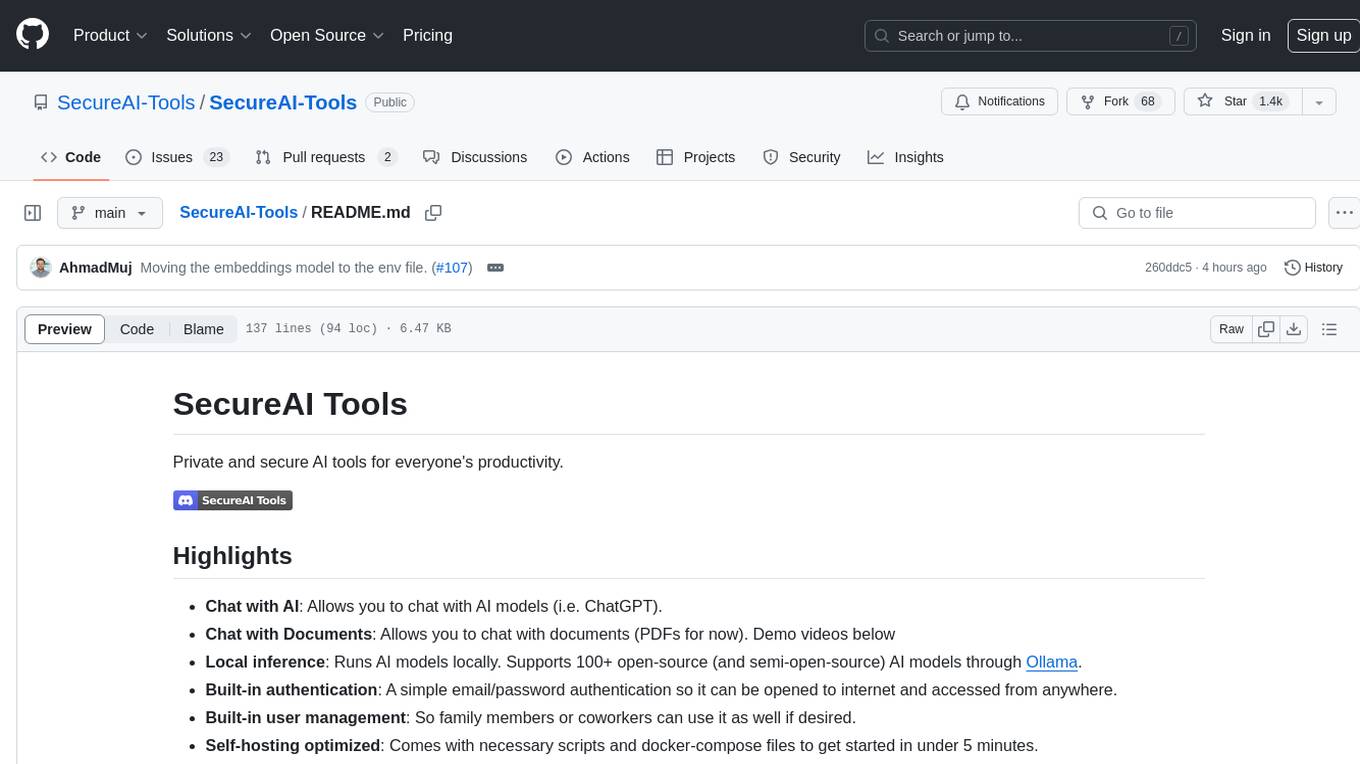
SecureAI-Tools
SecureAI Tools is a private and secure AI tool that allows users to chat with AI models, chat with documents (PDFs), and run AI models locally. It comes with built-in authentication and user management, making it suitable for family members or coworkers. The tool is self-hosting optimized and provides necessary scripts and docker-compose files for easy setup in under 5 minutes. Users can customize the tool by editing the .env file and enabling GPU support for faster inference. SecureAI Tools also supports remote OpenAI-compatible APIs, with lower hardware requirements for using remote APIs only. The tool's features wishlist includes chat sharing, mobile-friendly UI, and support for more file types and markdown rendering.
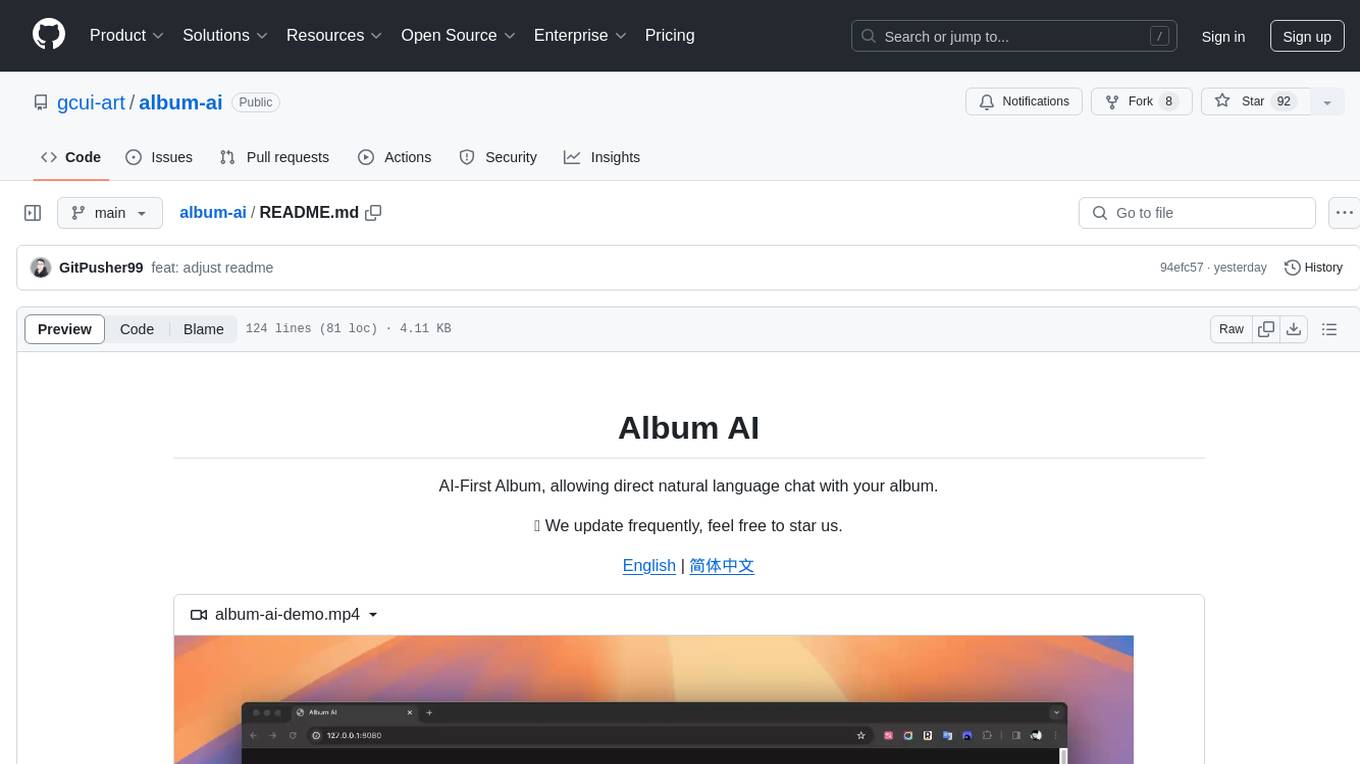
album-ai
Album AI is an experimental project that uses GPT-4o-mini to automatically identify metadata from image files in the album. It leverages RAG technology to enable conversations with the album, serving as a photo album or image knowledge base to assist in content generation. The tool provides APIs for search and chat functionalities, supports one-click deployment to platforms like Render, and allows for integration and modification under a permissive open-source license.
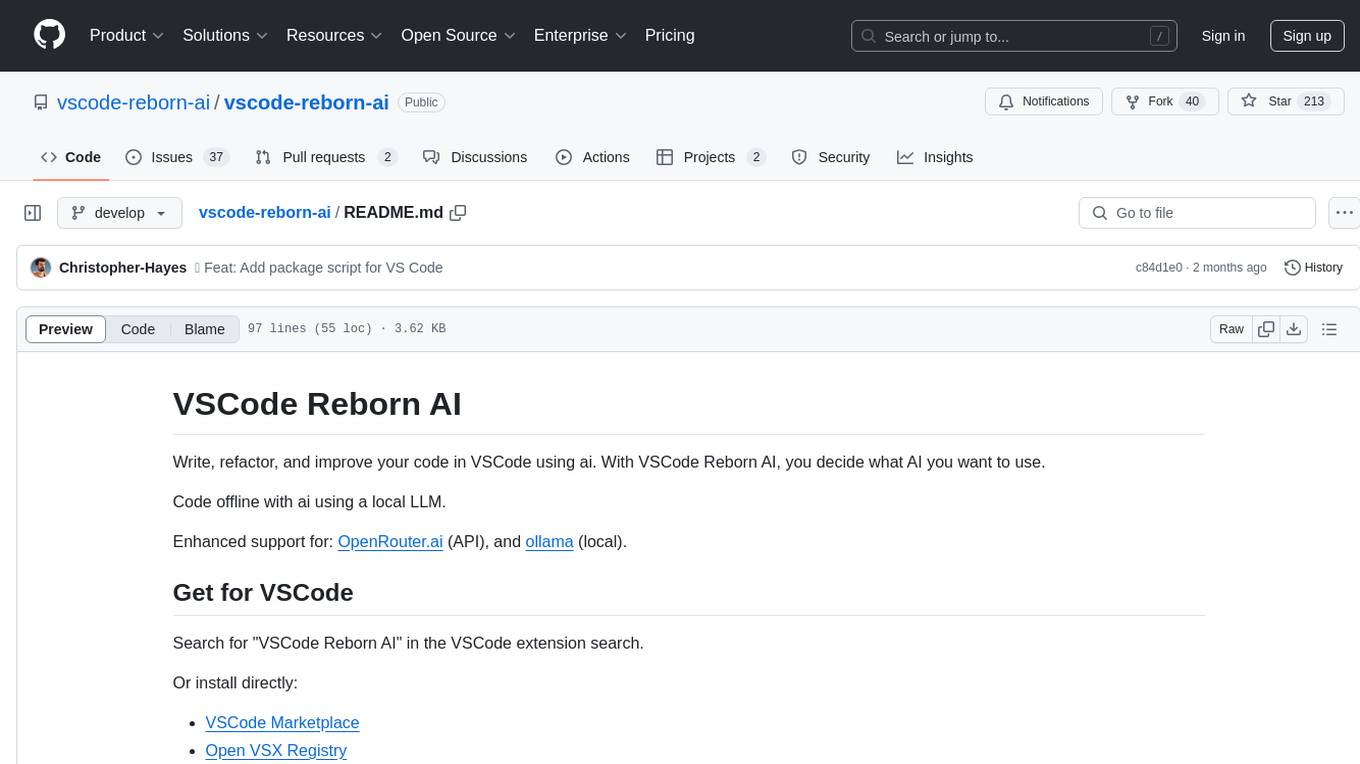
vscode-reborn-ai
VSCode Reborn AI is a tool that allows users to write, refactor, and improve code in Visual Studio Code using artificial intelligence. Users can work offline with AI using a local LLM. The tool provides enhanced support for OpenRouter.ai API and ollama. It also offers compatibility with various local LLMs and alternative APIs. Additionally, it includes features such as internationalization, development setup instructions, testing in VS Code, packaging for VS Code, tech stack details, and licensing information.
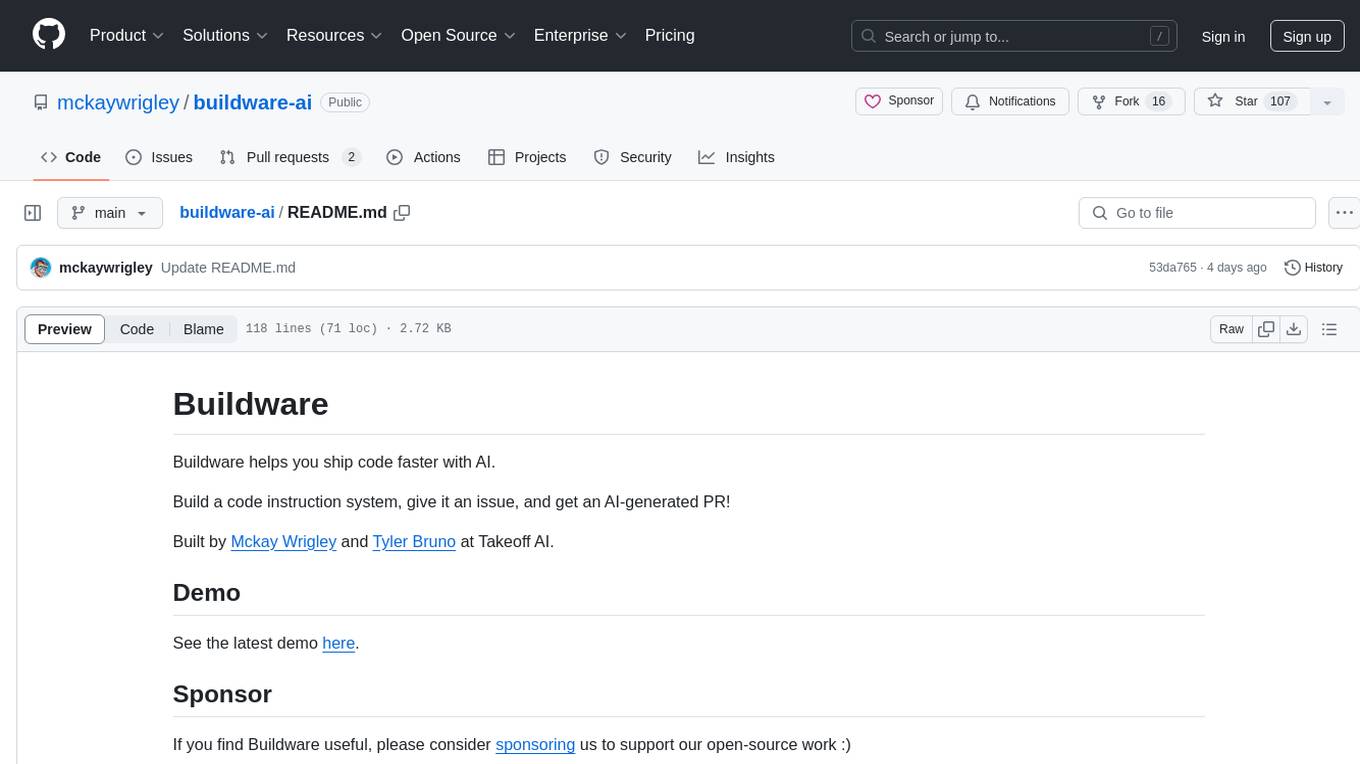
buildware-ai
Buildware is a tool designed to help developers accelerate their code shipping process by leveraging AI technology. Users can build a code instruction system, submit an issue, and receive an AI-generated pull request. The tool is created by Mckay Wrigley and Tyler Bruno at Takeoff AI. Buildware offers a simple setup process involving cloning the repository, installing dependencies, setting up environment variables, configuring a database, and obtaining a GitHub Personal Access Token (PAT). The tool is currently being updated to include advanced features such as Linear integration, local codebase mode, and team support.
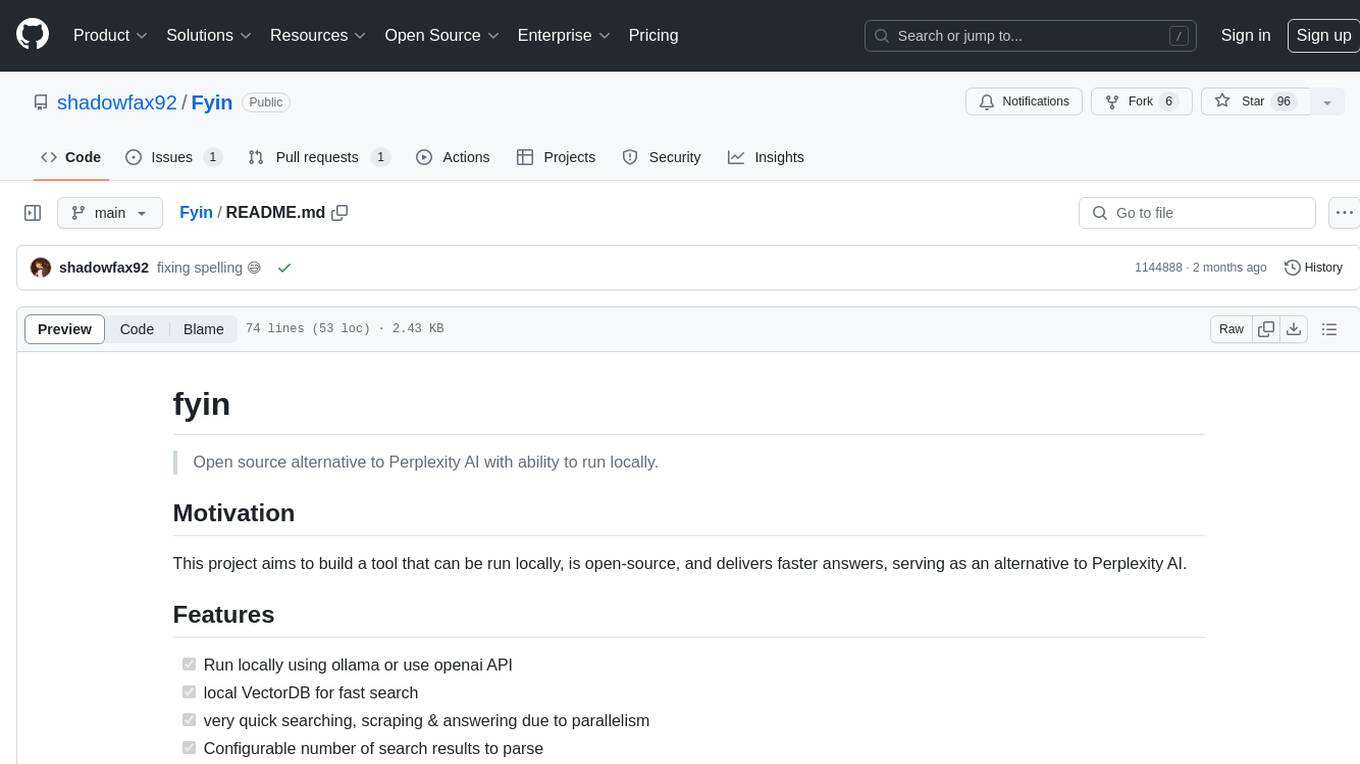
Fyin
Fyin is an open-source tool that serves as an alternative to Perplexity AI, allowing users to run it locally for faster answers. It features the ability to run locally using ollama or OpenAI API, a local VectorDB for fast search, quick searching, scraping & answering due to parallelism, configurable number of search results to parse, and local scraping of websites. The tool aims to provide a more efficient and customizable solution for obtaining answers through search and scraping functionalities.
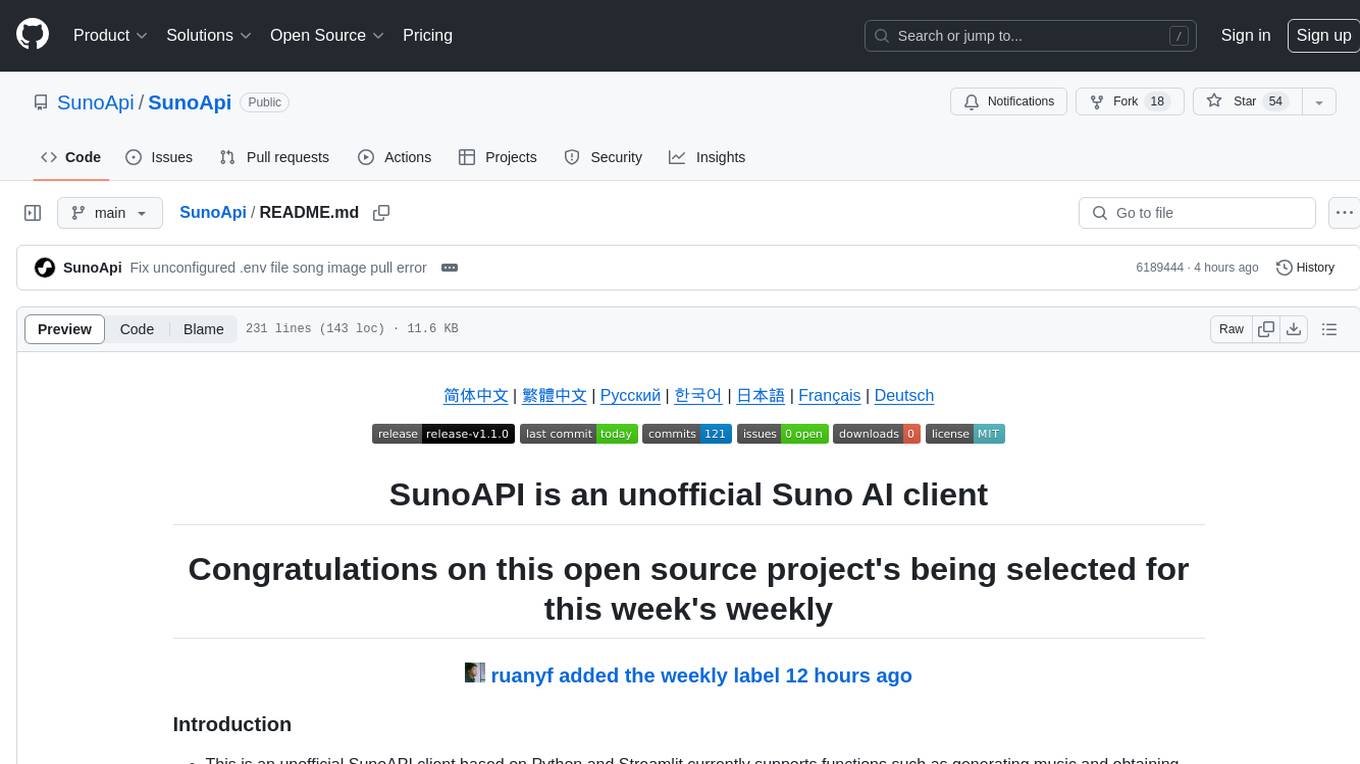
SunoApi
SunoAPI is an unofficial client for Suno AI, built on Python and Streamlit. It supports functions like generating music and obtaining music information. Users can set up multiple account information to be saved for use. The tool also features built-in maintenance and activation functions for tokens, eliminating concerns about token expiration. It supports multiple languages and allows users to upload pictures for generating songs based on image content analysis.
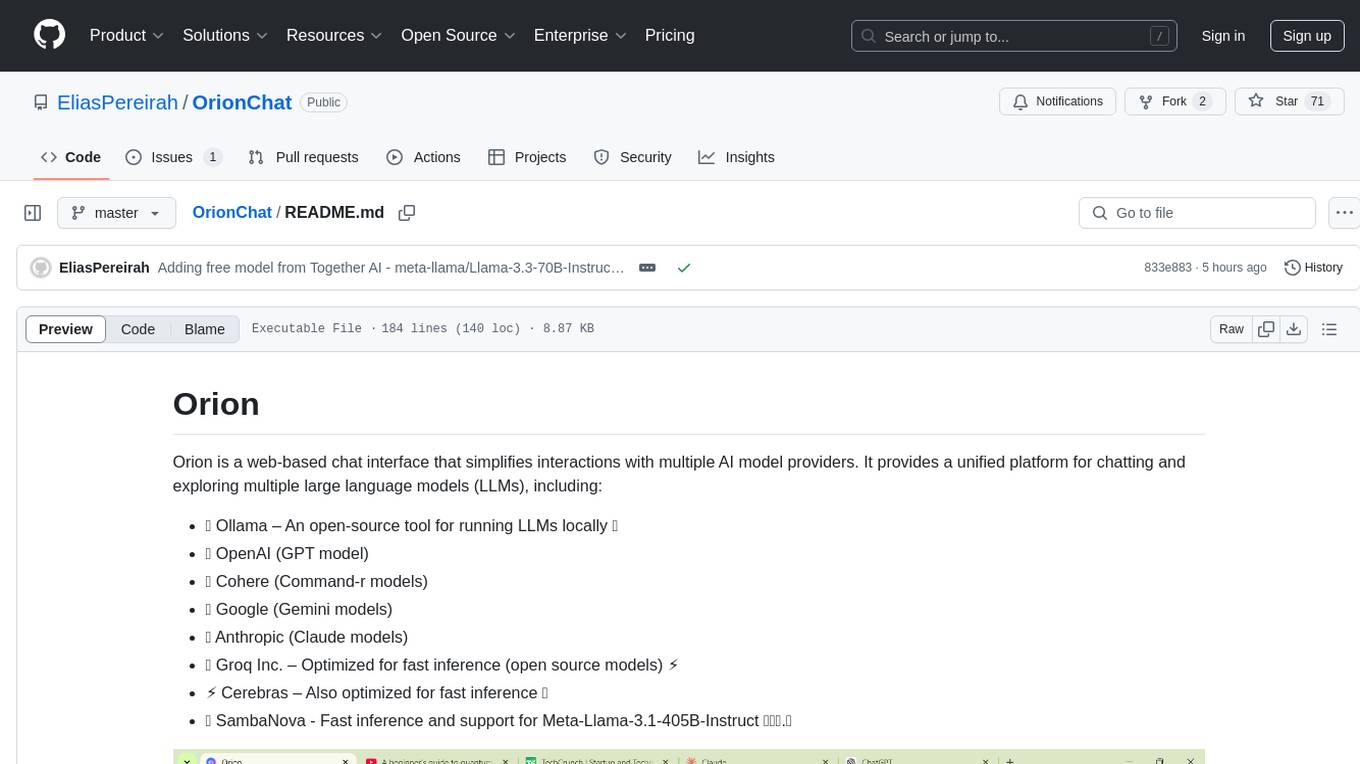
OrionChat
Orion is a web-based chat interface that simplifies interactions with multiple AI model providers. It provides a unified platform for chatting and exploring various large language models (LLMs) such as Ollama, OpenAI (GPT model), Cohere (Command-r models), Google (Gemini models), Anthropic (Claude models), Groq Inc., Cerebras, and SambaNova. Users can easily navigate and assess different AI models through an intuitive, user-friendly interface. Orion offers features like browser-based access, code execution with Google Gemini, text-to-speech (TTS), speech-to-text (STT), seamless integration with multiple AI models, customizable system prompts, language translation tasks, document uploads for analysis, and more. API keys are stored locally, and requests are sent directly to official providers' APIs without external proxies.
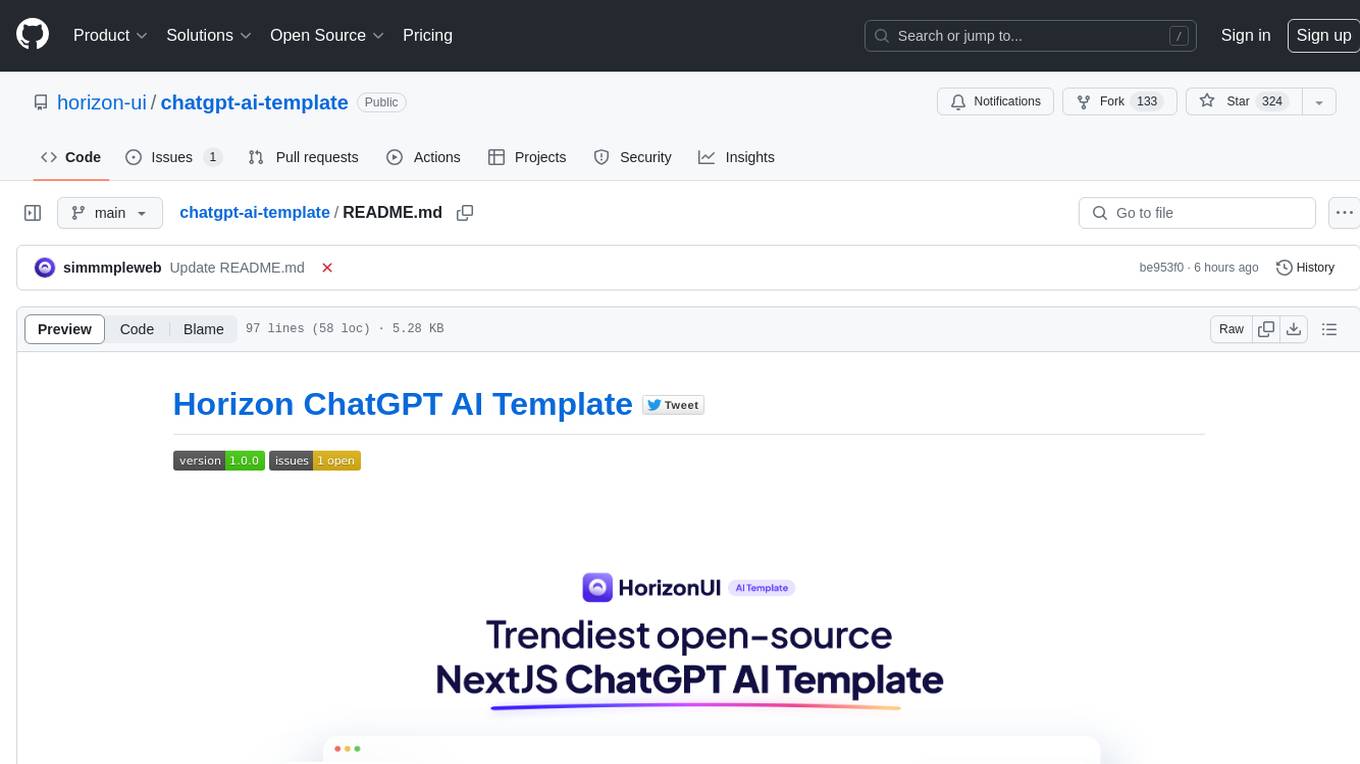
chatgpt-ai-template
Horizon ChatGPT AI Template is an open-source Free ChatGPT AI Admin Template for NextJS & React. It is built with React, NextJS, and Chakra UI, offering over 30+ dark/light frontend elements for creating outstanding Chat AI SaaS Apps faster. The template comes with detailed documentation and example pages to help users get started quickly. Users need to have a valid OpenAI account and API key to use ChatGPT. The template is available in both Free and PRO versions, with a Figma version also available. Users can connect with the community through the #HorizonUI Discord Community.
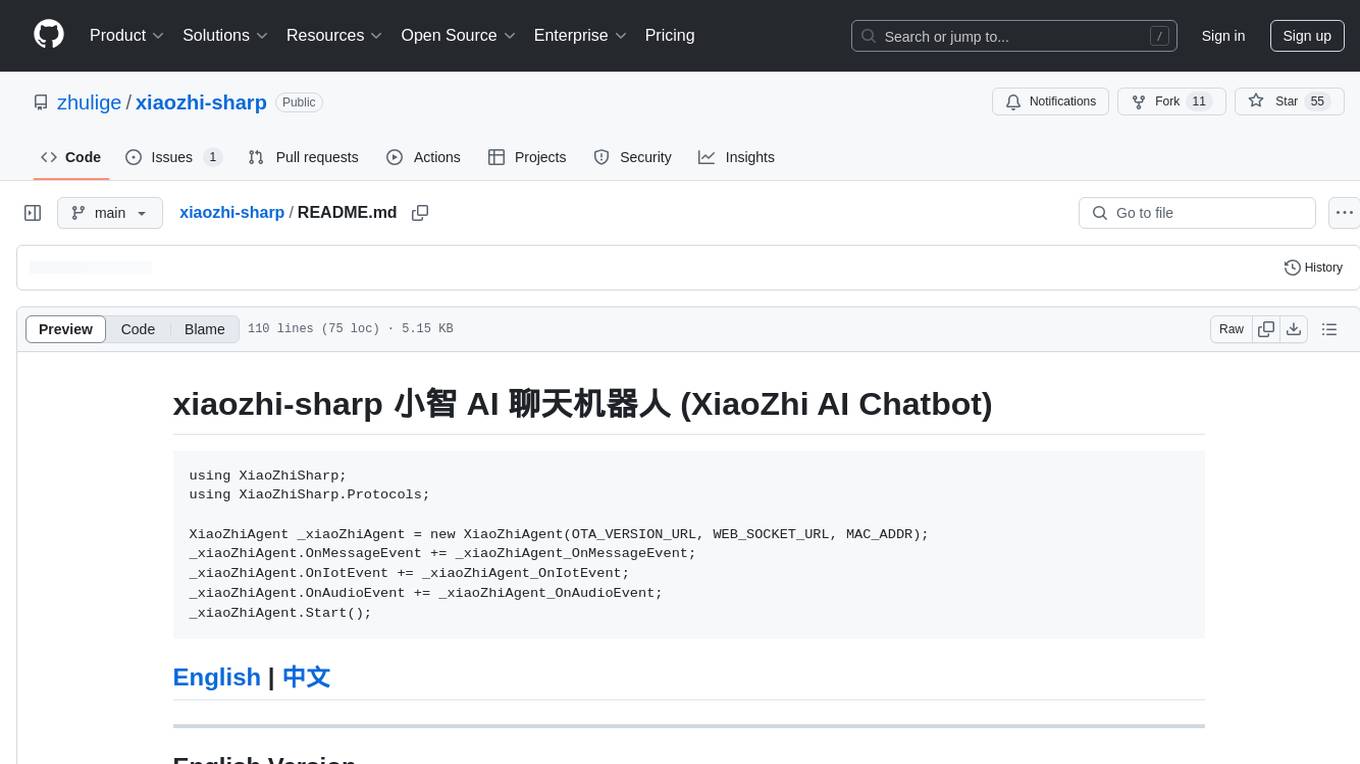
xiaozhi-sharp
xiaozhi-sharp is a meticulously crafted XiaoZhi client in C#, serving as a code learning example and enabling intelligent interaction with XiaoZhi AI without related hardware. It connects to xiaozhi.me server for stable services. The tool includes a debugging feature to understand XiaoZhi's commands and a console client for interaction. Users need .NET Core SDK to run the project smoothly, ensuring stable network connection for optimal usage. Contributions and feedback are welcome for project improvement and community engagement.
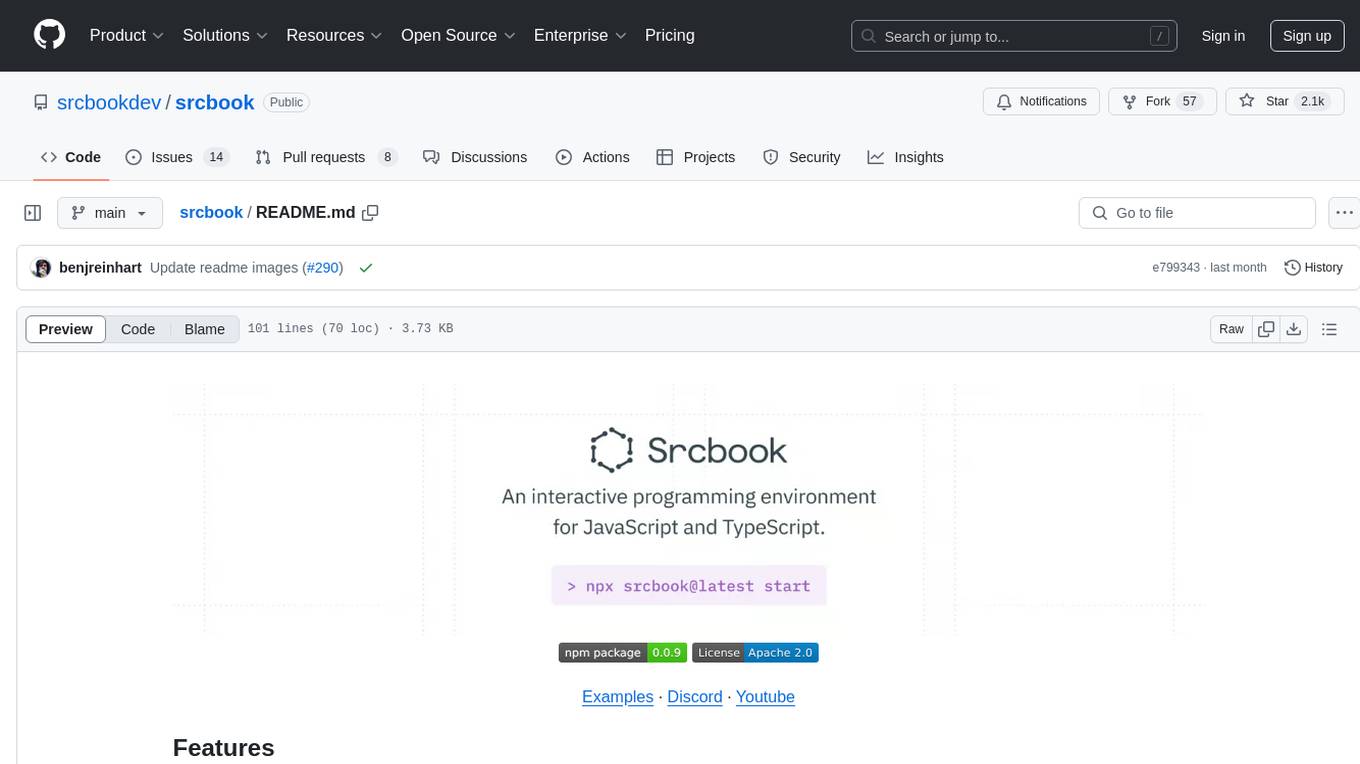
srcbook
Srcbook is an open-source interactive programming environment for TypeScript that allows users to create, run, and share reproducible programs and ideas. It features AI capabilities for exploring and iterating on ideas, supports exporting to valid markdown format, and enables diagraming with mermaid for rich annotations. Users can locally execute programs through a web interface, powered by Node.js under the Apache2 license.

chatbot-ui
Chatbot UI is an open-source AI chat app that allows users to create and deploy their own AI chatbots. It is easy to use and can be customized to fit any need. Chatbot UI is perfect for businesses, developers, and anyone who wants to create a chatbot.
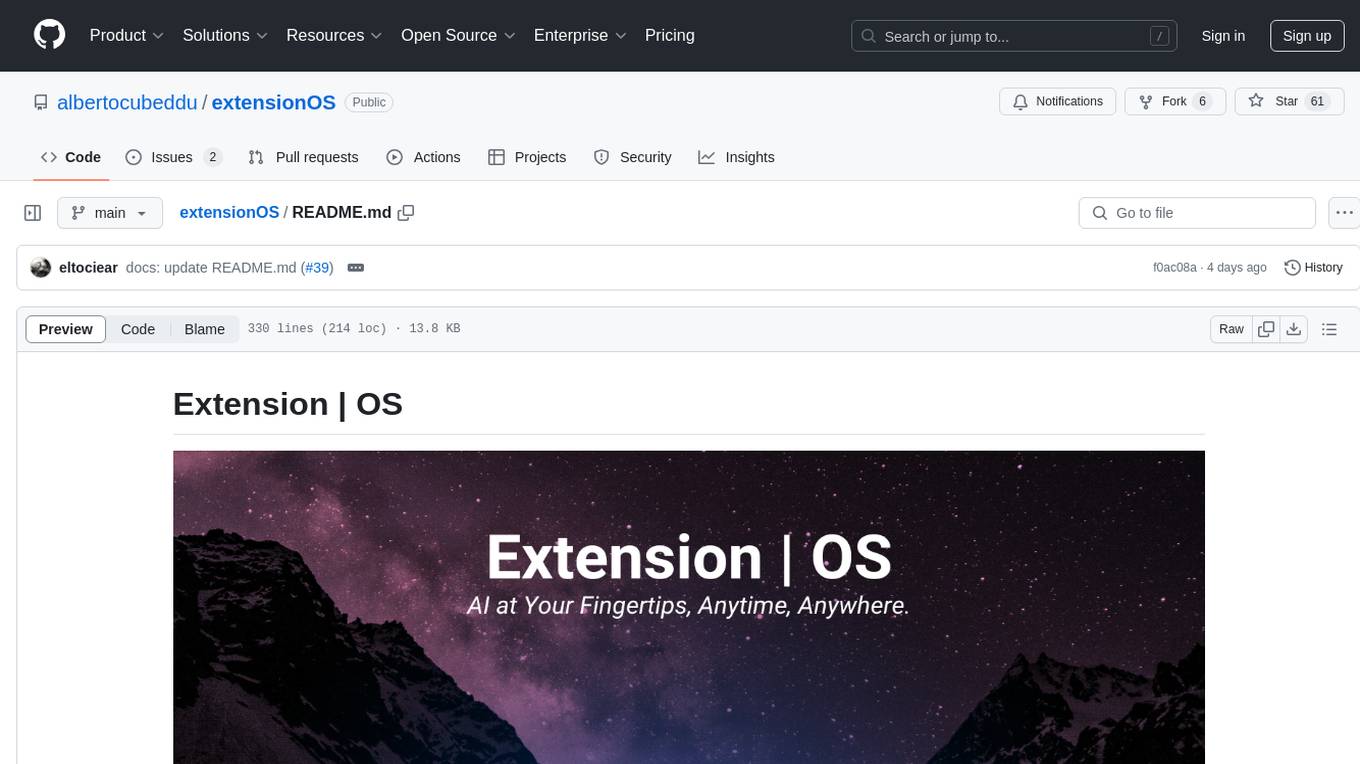
extensionOS
Extension | OS is an open-source browser extension that brings AI directly to users' web browsers, allowing them to access powerful models like LLMs seamlessly. Users can create prompts, fix grammar, and access intelligent assistance without switching tabs. The extension aims to revolutionize online information interaction by integrating AI into everyday browsing experiences. It offers features like Prompt Factory for tailored prompts, seamless LLM model access, secure API key storage, and a Mixture of Agents feature. The extension was developed to empower users to unleash their creativity with custom prompts and enhance their browsing experience with intelligent assistance.
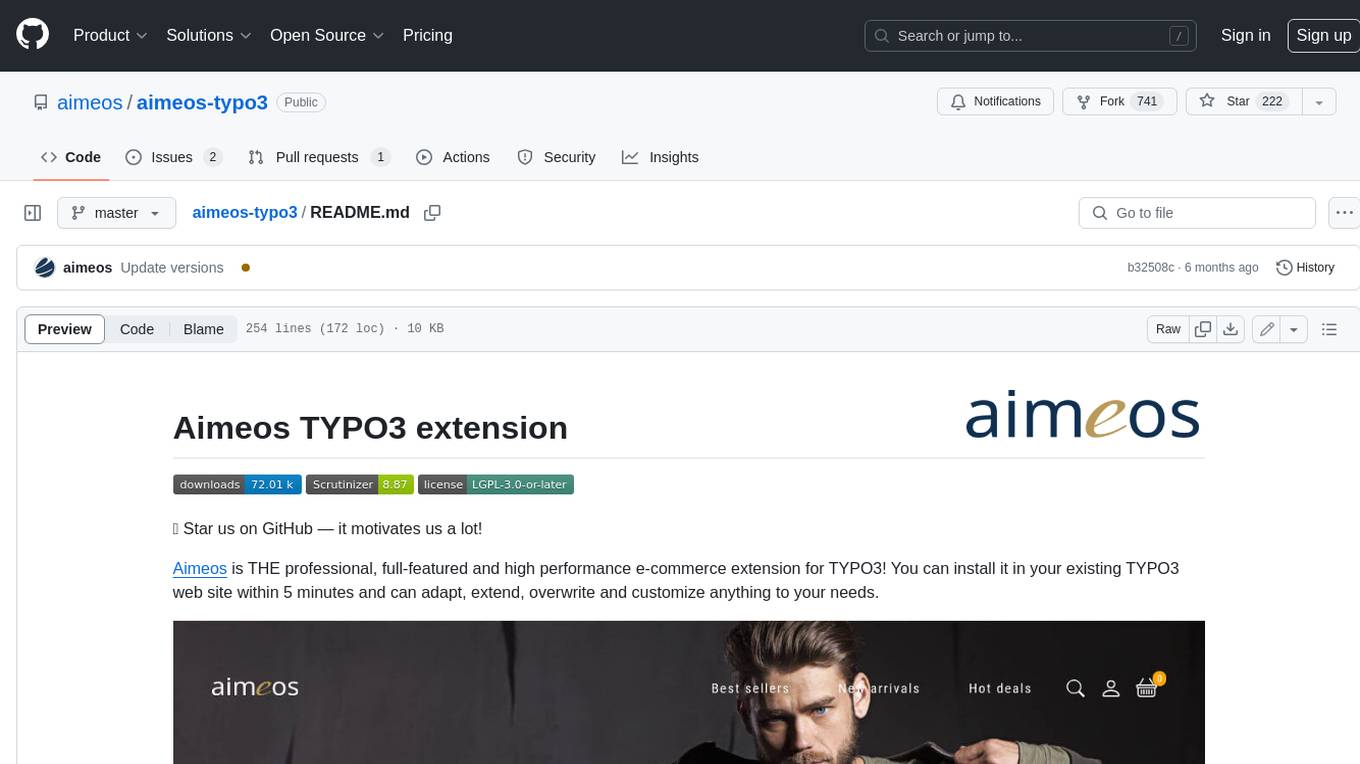
aimeos-typo3
Aimeos is a professional, full-featured, and high-performance e-commerce extension for TYPO3. It can be installed in an existing TYPO3 website within 5 minutes and can be adapted, extended, overwritten, and customized to meet specific needs.
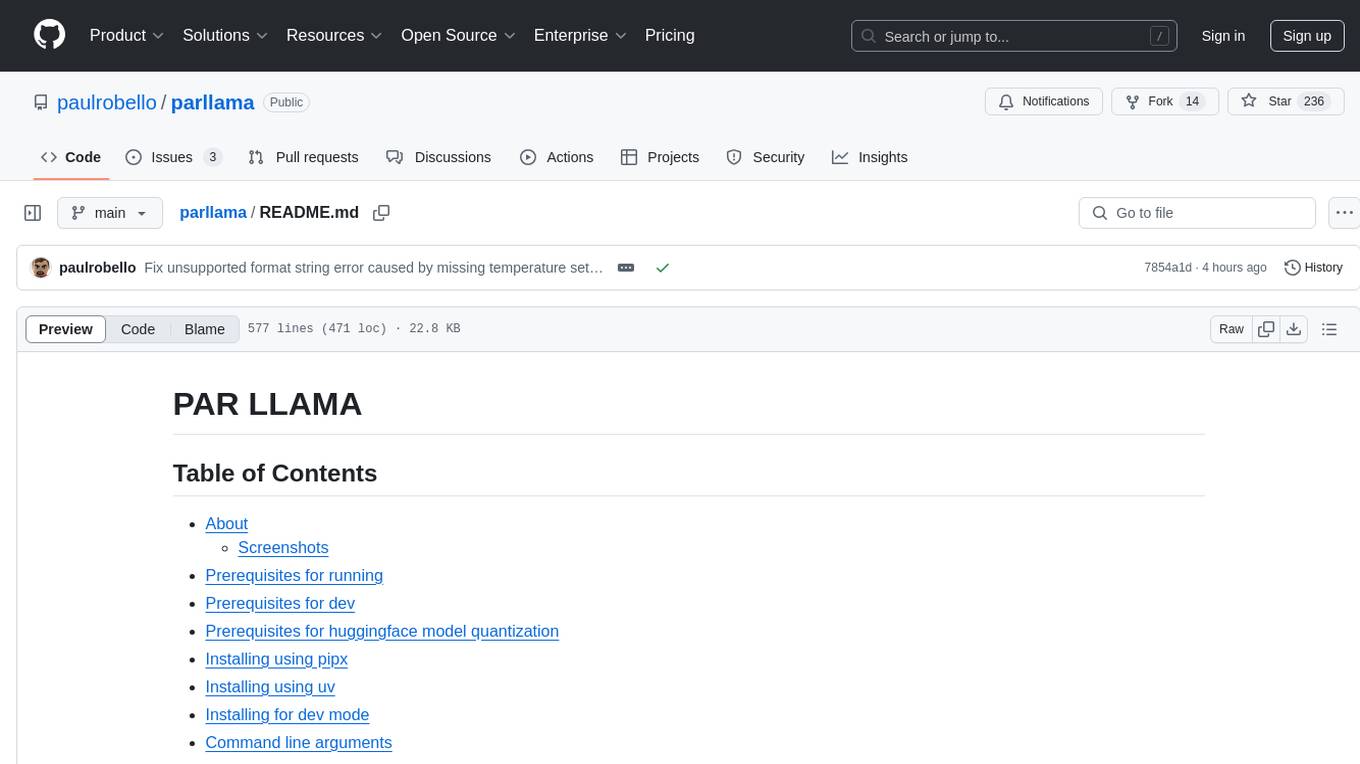
parllama
PAR LLAMA is a Text UI application for managing and using LLMs, designed with Textual and Rich and PAR AI Core. It runs on major OS's including Windows, Windows WSL, Mac, and Linux. Supports Dark and Light mode, custom themes, and various workflows like Ollama chat, image chat, and OpenAI provider chat. Offers features like custom prompts, themes, environment variables configuration, and remote instance connection. Suitable for managing and using LLMs efficiently.
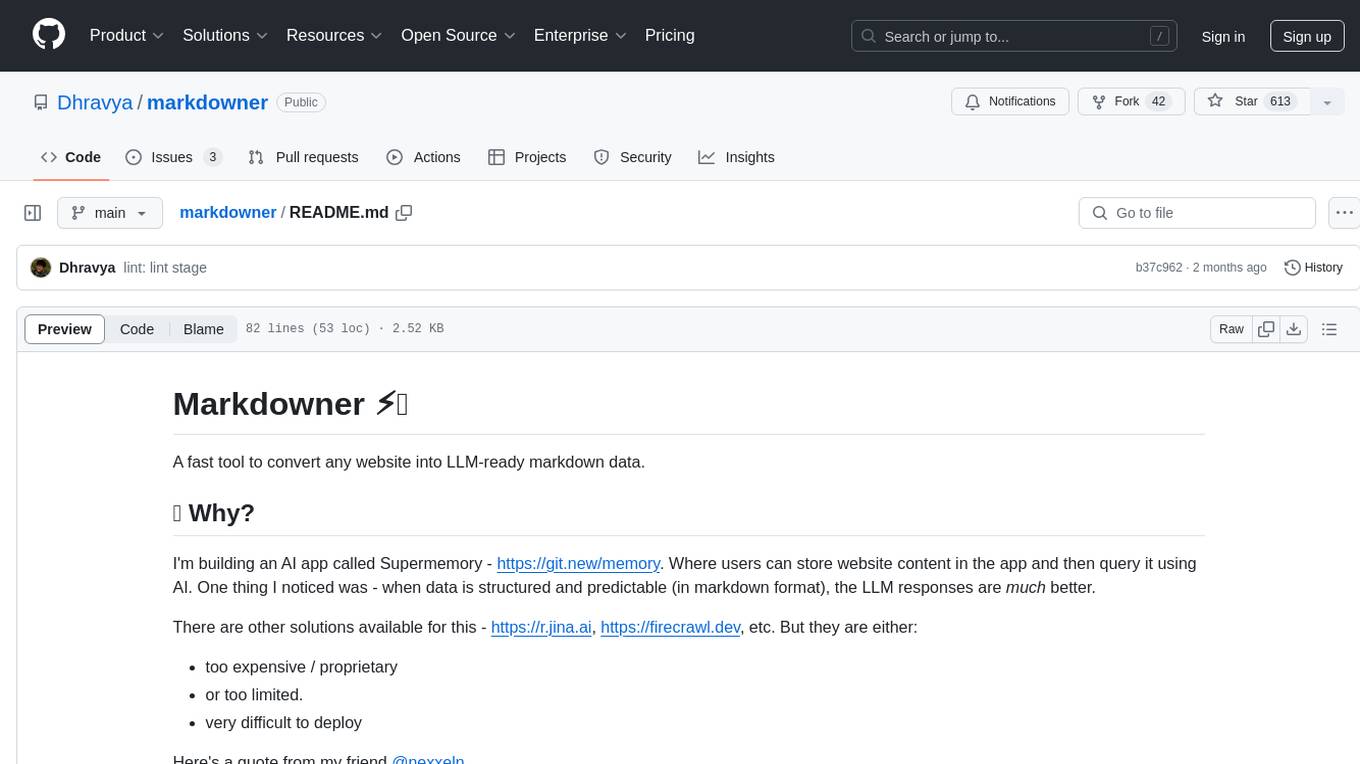
markdowner
Markdowner is a fast tool designed to convert any website into LLM-ready markdown data. It aims to improve the quality of responses in the AI app Supermemory by structuring and predicting data in markdown format. The tool offers features such as website conversion, LLM filtering, detailed markdown mode, auto crawler, text and JSON responses, and easy self-hosting. Markdowner utilizes Cloudflare's Browser rendering and Durable objects for browser instance creation and markdown conversion. Users can self-host the project with the Workers paid plan, following simple steps. Support the project by starring the repository.
For similar tasks

tap4-ai-webui
Tap4 AI Web UI is an open source AI tools directory built by Tap4 AI Tools Directory. The project aims to help everyone build their own AI Tools Directory easily. Users can fork the project, deploy it to Vercel with one click, and update their own AI tools using the data list in the project. The web UI features internationalization, SEO friendliness, dynamic sitemap generation, fast shipping, NEXT 14 with app route, and integration with Supabase serverless database.
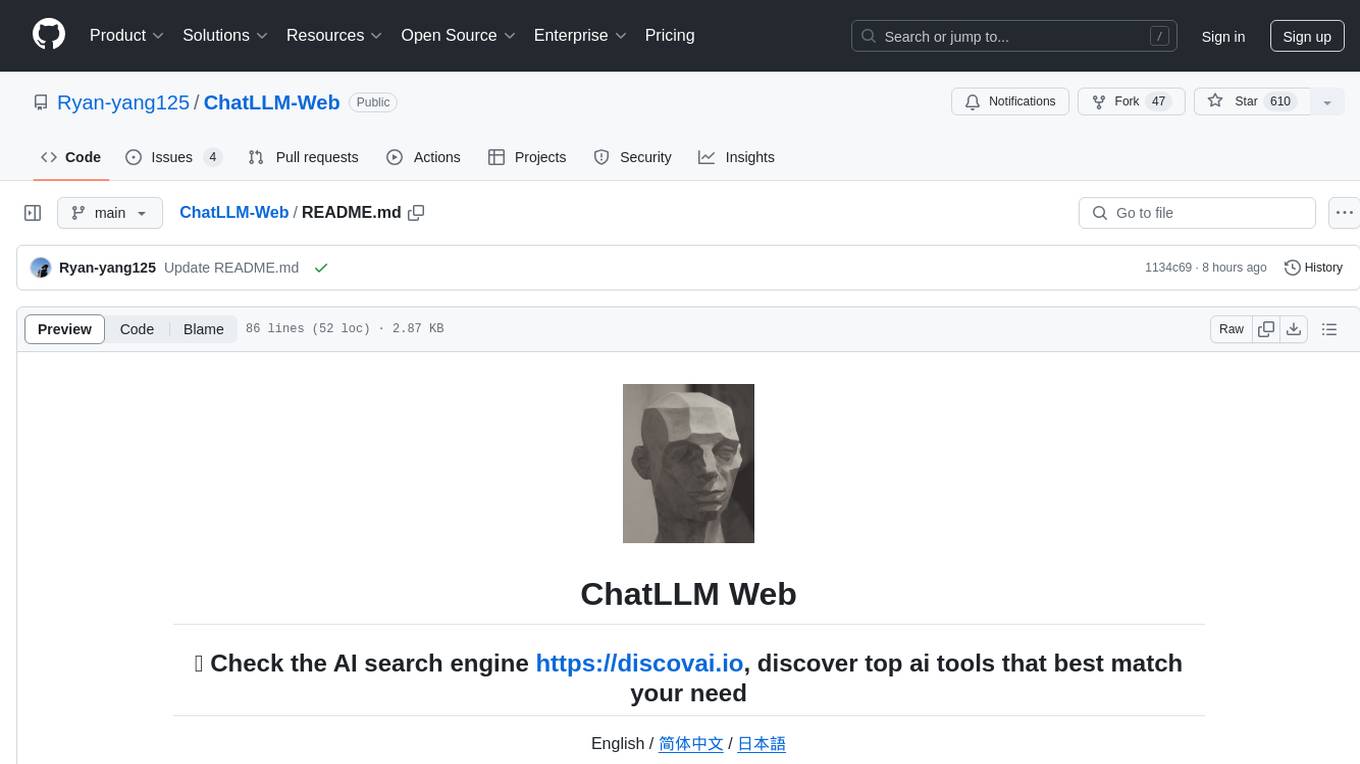
ChatLLM-Web
ChatLLM Web is a browser-based AI chat tool powered by WebGPU, providing a seamless and private chat experience. It runs models in a web worker, supports model caching, and offers multi-conversation chat with data stored locally. The tool features a well-designed UI with dark mode, PWA support for offline use, and markdown and streaming response capabilities. Users can deploy it easily on Vercel and interact with the AI like Vicuna in their browser.
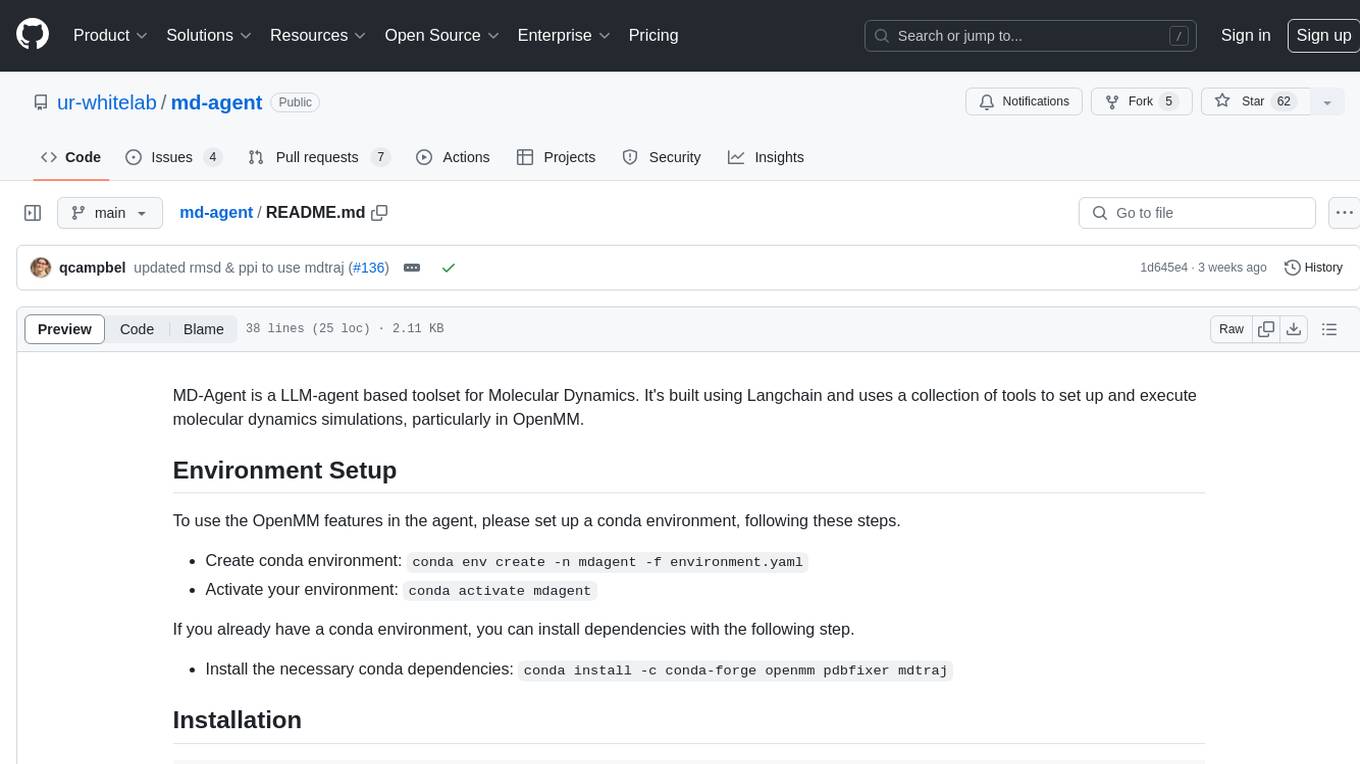
md-agent
MD-Agent is a LLM-agent based toolset for Molecular Dynamics. It uses Langchain and a collection of tools to set up and execute molecular dynamics simulations, particularly in OpenMM. The tool assists in environment setup, installation, and usage by providing detailed steps. It also requires API keys for certain functionalities, such as OpenAI and paper-qa for literature searches. Contributions to the project are welcome, with a detailed Contributor's Guide available for interested individuals.
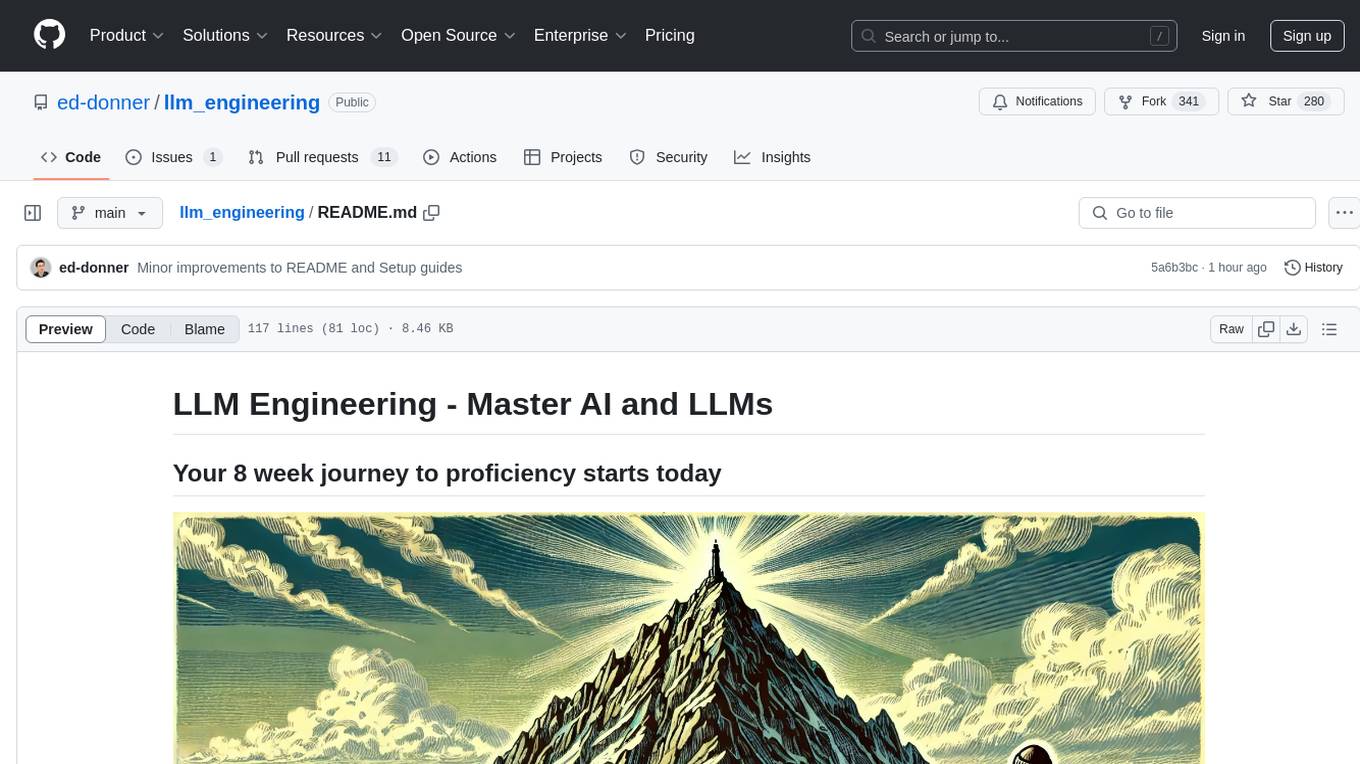
llm_engineering
LLM Engineering is an 8-week course designed to help learners master AI and LLMs through a series of projects that gradually increase in complexity. The course covers setting up the environment, working with APIs, using Google Colab for GPU processing, and building an autonomous Agentic AI solution. Learners are encouraged to actively participate, run code cells, tweak code, and share their progress with the community. The emphasis is on practical, educational projects that teach valuable business skills.
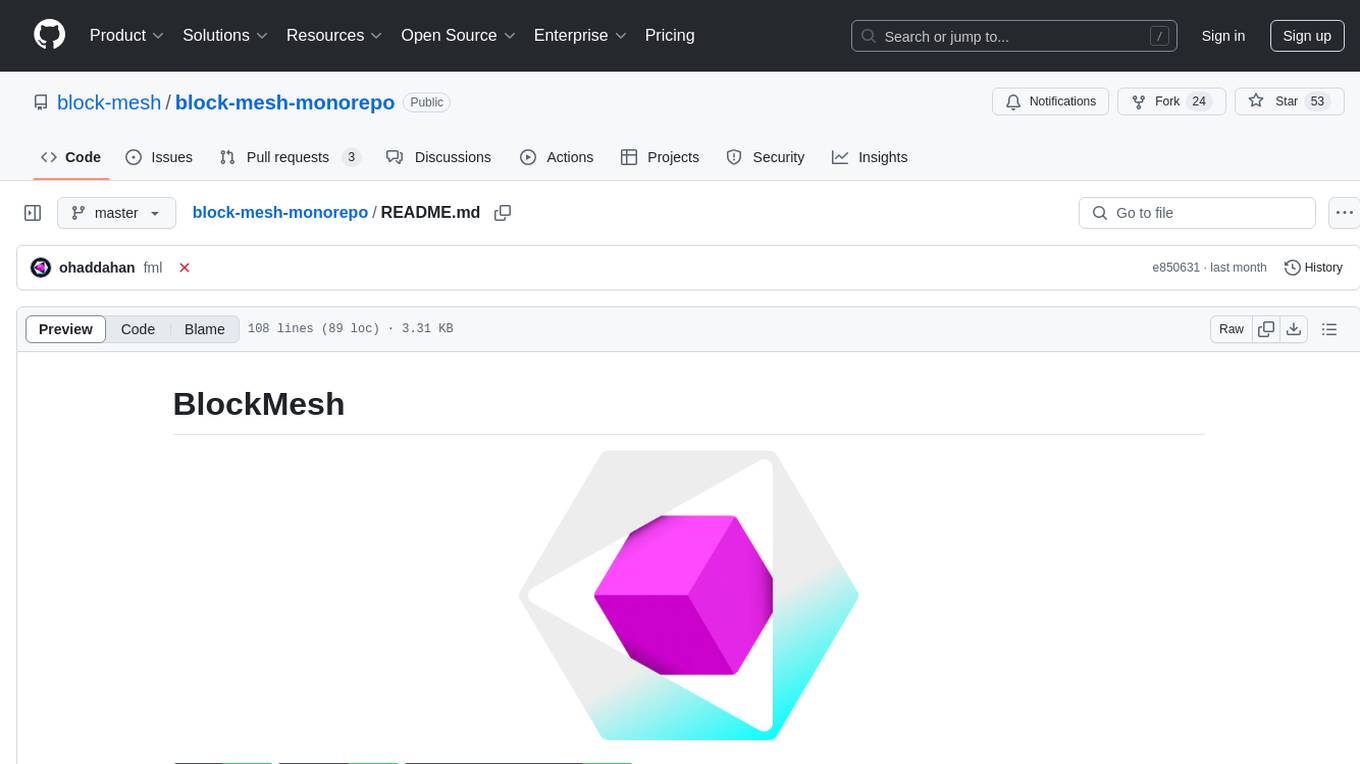
block-mesh-monorepo
BlockMesh is a monorepo containing various tools and scripts for managing a blockchain mesh network. It provides functionalities for setting up environment variables, installing necessary dependencies, running local scripts, and implementing Git hooks for pre-commit and pre-push actions. The repository includes tools for cargo, sqlx-cli, wasm-pack, bunyan, psql, and Docker, along with configurations for different APIs like Twitter and AWS.
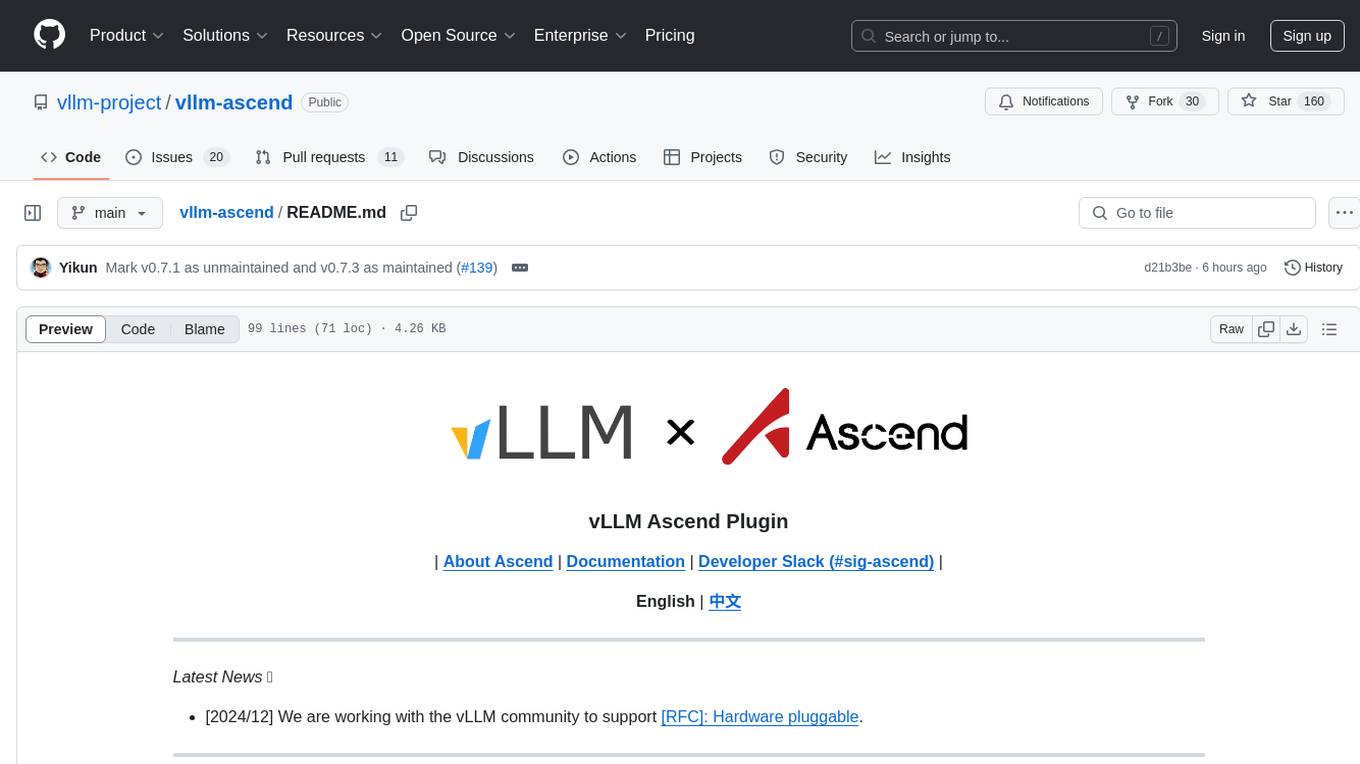
vllm-ascend
vLLM Ascend plugin is a backend plugin designed to run vLLM on the Ascend NPU. It provides a hardware-pluggable interface that allows popular open-source models to run seamlessly on the Ascend NPU. The plugin is recommended within the vLLM community and adheres to the principles of hardware pluggability outlined in the RFC. Users can set up their environment with specific hardware and software prerequisites to utilize this plugin effectively.
For similar jobs

sweep
Sweep is an AI junior developer that turns bugs and feature requests into code changes. It automatically handles developer experience improvements like adding type hints and improving test coverage.

teams-ai
The Teams AI Library is a software development kit (SDK) that helps developers create bots that can interact with Teams and Microsoft 365 applications. It is built on top of the Bot Framework SDK and simplifies the process of developing bots that interact with Teams' artificial intelligence capabilities. The SDK is available for JavaScript/TypeScript, .NET, and Python.

ai-guide
This guide is dedicated to Large Language Models (LLMs) that you can run on your home computer. It assumes your PC is a lower-end, non-gaming setup.

classifai
Supercharge WordPress Content Workflows and Engagement with Artificial Intelligence. Tap into leading cloud-based services like OpenAI, Microsoft Azure AI, Google Gemini and IBM Watson to augment your WordPress-powered websites. Publish content faster while improving SEO performance and increasing audience engagement. ClassifAI integrates Artificial Intelligence and Machine Learning technologies to lighten your workload and eliminate tedious tasks, giving you more time to create original content that matters.

chatbot-ui
Chatbot UI is an open-source AI chat app that allows users to create and deploy their own AI chatbots. It is easy to use and can be customized to fit any need. Chatbot UI is perfect for businesses, developers, and anyone who wants to create a chatbot.

BricksLLM
BricksLLM is a cloud native AI gateway written in Go. Currently, it provides native support for OpenAI, Anthropic, Azure OpenAI and vLLM. BricksLLM aims to provide enterprise level infrastructure that can power any LLM production use cases. Here are some use cases for BricksLLM: * Set LLM usage limits for users on different pricing tiers * Track LLM usage on a per user and per organization basis * Block or redact requests containing PIIs * Improve LLM reliability with failovers, retries and caching * Distribute API keys with rate limits and cost limits for internal development/production use cases * Distribute API keys with rate limits and cost limits for students

uAgents
uAgents is a Python library developed by Fetch.ai that allows for the creation of autonomous AI agents. These agents can perform various tasks on a schedule or take action on various events. uAgents are easy to create and manage, and they are connected to a fast-growing network of other uAgents. They are also secure, with cryptographically secured messages and wallets.

griptape
Griptape is a modular Python framework for building AI-powered applications that securely connect to your enterprise data and APIs. It offers developers the ability to maintain control and flexibility at every step. Griptape's core components include Structures (Agents, Pipelines, and Workflows), Tasks, Tools, Memory (Conversation Memory, Task Memory, and Meta Memory), Drivers (Prompt and Embedding Drivers, Vector Store Drivers, Image Generation Drivers, Image Query Drivers, SQL Drivers, Web Scraper Drivers, and Conversation Memory Drivers), Engines (Query Engines, Extraction Engines, Summary Engines, Image Generation Engines, and Image Query Engines), and additional components (Rulesets, Loaders, Artifacts, Chunkers, and Tokenizers). Griptape enables developers to create AI-powered applications with ease and efficiency.
